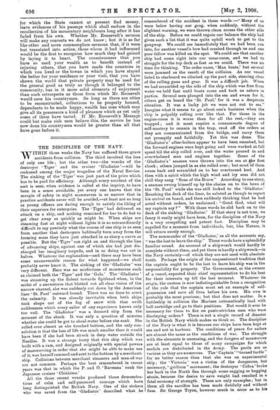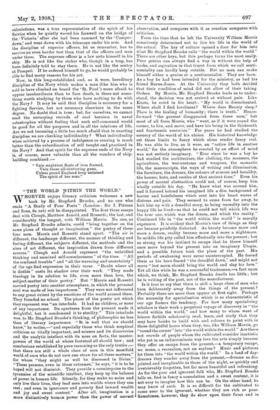THE DISCIPLINE OF THE NAVY.
WITHIN three weeks the Navy has suffered three grave accidents from collision. The third involved the loss of only one life ; but the other two—the wrecks of the destroyer 'Tiger' and the cruiser Gladiator '—will be reckoned among the major tragedies of the Naval Service. The sinking of the 'Tiger' was just part of the price which has to be paid for efficiency. Although every accident of the sort is seen, when evidence is called at the inquiry, to have been in a sense avoidable, yet every one knows that the margin of safety in night manceuvres is so narrow that in practice accidents never will be avoided,—at least not so long as young officers are daring enough to satisfy the liking of their superiors for enterprise. The 'Tiger' bad delivered an attack on a Chip, and nothing remained for her to do but to get clear away as quickly as might be. When ships are steaming fast • at night without lights it is so extraordinarily difficult to say precisely what the course of one ship is as seen from another that destroyers habitually turn away from the looming mass they have just attacked in as sharp a curve as possible.' But the 'Tiger' ran right on and through the line of advancing ships, against one of which she had just dis- charged her imaginary torpedo, and in so doing was cut in halves. Whatever the explanation—and there may have been some unanswerable reason for what happened—we shall probably never know it.. The sinking of the 'Gladiator' was very different. Here was no misfortune of manceuvres such as claimed both the ' Tiger ' and the Gala.' . The 'Gladiator' was steaming up the Solent towards Spitbead when, in the midst of a snowstorm that blotted out all clear vision of the narrow channel, she was suddenly cut down by the American liner 'St. Paul' outward bound. There was no time to avert the calamity. It was already inevitable when both ships took - shape out of the fog of snow with that swift suddenness which every sailor of any experience knows only too well. The 'Gladiator' was a doomed ship from the moment of the shock. It was only a question of minutes whether she could be got to shoal-water before she sank. She rolled over almost as she touched bottom, and the only con- solation is that the loss of life was much smaller than it would have been if she had been struck in deep water outside the Needles. It was a strange irony that this ship which was bUilt with a ram, and designed originally with special powers of manceuviing in order that she might be able to make use of it, was herself rammed and sent to the bottom by a merchant- ship. Collisions between merchant steamers and men-of-war are not common. Perhaps the best remembered in recent years was that in whiali the P. and 0. "Ravenna' sunk the Japanese cruiser Chishima.' All the three recent wrecks .produced 'those .demonstra- tions of calm. and self-poisessed . courage which have long distingnished the British Navy. One of the stokers who was saved from the 'Gladiator' : described what.. he remembered of the accident in these words :—" Many of us were below having our grog, when suddenly, without the slightest warning, we were thrown clean across the other side of the ship. Before we could regain our balance the ship had given such a list that it was quite uphill work to get to the gangway. We could see immediately that we had been run into, for another vessel's bow had crashed through us and one poor fellow was killed on the spot. We could see that another ship had come right into our mess-room, and we had to struggle for the top deck as fast as we could. There was no. time for thinking. The order came, 'Man boats,' but several were jammed as the result of the collision. As our vessel listed to starboard we climbed up the port side, steering clear of the rolling guns and gear. It was a difficult job. When we had scrambled up the side of the ship which was free from water we held fast until boats came and took us ashore in parties. Several men plunged into the sea and swam for it, others got on board the 'St. Paul,' for it was a desperate situation. It was a lucky job we were not out to sea." Imagine what it means to go about one's 'business when the ship is palpably rolling over like that. For those in the engine-room it is worse than for all the rest,—they are trapped ; and it must require a consummate degree of self-mastery to remain in the trap, read off the orders as they are communicated from the bridge, and carry them' out promptly and faithfully. Yet this was done. The 'Gladiator's' after-boilers appear to have been smashed, but the forward engines were kept going and were worked at full speed till the ship rolled over, and the water poured in-and overwhelmed men and engines together. Some of the 'Gladiator's' seamen were thrown into the sea at $101e first shock ; others jumped in as she rolled over; butmost-of them swam back and scrambled on to her overturned keel. And then with a spirit which the high wind 'and icy seas did not chill they sang "Sons of the Brave." According to one story, a seaman swung himself up by the chains on to the bows of the St. Paul' while she was still locked to the Gladiator.' Reaching the deck of the liner, he saluted as though to report his arrival on board, and then suddenly thinking that he had acted without orders, he exclaimed : "Good God, what will my captain say ?" With those words he slid back on to the deck of the sinking Gladiator.' If that story is not true, we fancy it easily might have been, for the discipline of the Navy is a very compelling and potent fact. Discipline may be expelled for a moment from individuals, but, like Nature, it will return surely enough.
The commander of the Gladiator,' as all the accounts say, " was.the last to leave the ship." Those words have a splendidly familiar sound. An account of a shipwreck would hardly be complete without them, and yet there is hardly a shipwreck—in the Navy certainly—of which they are not used with absolute truth. Perhaps the origin of the unquestioned tradition that the captain ought to be the last to leave his ship was in' the responsibility for property. The Government, or the owners of a vessel, expected their chief representative' to do his best for their interests up till the last moment. Whatever its origin, the custom is now indistinguishable from a recognition of the rule that the captain must set an example of self- possession and save all lives before his own. His own -is probably the most precious ; but that does not matter. In a battleship in collision the Marines automatically load with ball cartridge and go to their positions. But would it ever be necessary for them to fire on panic-stricken men who were disobeying orders ? There is not a single record of disaster in the British Navy which makes us think so. The discipline of the Navy is what it is because our ships have been kept at sea and not 'in harbour. The conditions of peace for sailors are almost the same as the conditions of .war. The struggle with the elements is unceasing, and the dangers of mauthuvres are at least equal to those of many campaigns for which medals are .distributed in the Army. The perils are as variouè. as they are numerous. " The 'Captain' "turned turtle" for no better reason than that she was an experimental ship ; the 'Victoria' was a victim of the dangerous, but necessary," gridiron " movement; the destroyer Cobra' broke her back in the North' Sea through some sagging or hogging strain, because the desire to save weight bad resulted in a fatal economy of strength.. These are only eiamples ; but in them: all the sacrifice has been made dutifully and without fuss. Sir :George Tryon,. however much in error as to his
calculations, was .a true representative of the spirit of his Service when he quietly waved his farewell on the bridge of the Vietoria' after she bad been rammed by the ' Camper- down,' and went down with his telescope under his arm. And the discipline of superior officers, let us remember, has to survive an even harder test than that of the officers and men under them. The Supreme officer ia a law unto himself in his
ship. He is not like the stoker who, though in a trap, has
been definitely told to stay there. He is not like the sentry at Pompeii. If he ordered himself to go, he would probably be able to find many reasons for his act.
- Now, in this long-established and, as it were, hereditary discipline of the Navy which makes a man (like him who is said to have climbed on board the Paul ') more afraid to appear insubordinate than to face death, is there not some- thing worth studying by those who have nothing to do with the Navy ? It may be said that discipline is necessary for a fighting Service, but not necessary elsewhere in the same degree. No doubt that is true ; but, for ourselves, we cannot read the unvarying records of cool heroism in naval catastrophes without feeling that such self-command would be good for all the purposes and in all the relations of life.
Are we not becoming a. little too much afraid that in exacting di-scipline we are checking individuality ? What individuality when achieved by a process of indulgence or coaxing is much better than the subordination of self taught and practised in the Navy ? And that spirit for the supreme ends of the Navy
of course, more valuable than all the wonders of ship- building combined :— " Vain mightiest fleets of iron framed, Vain those all-shattering guns, Unless proud England keep untamed The spirit of her sons."









































 Previous page
Previous page